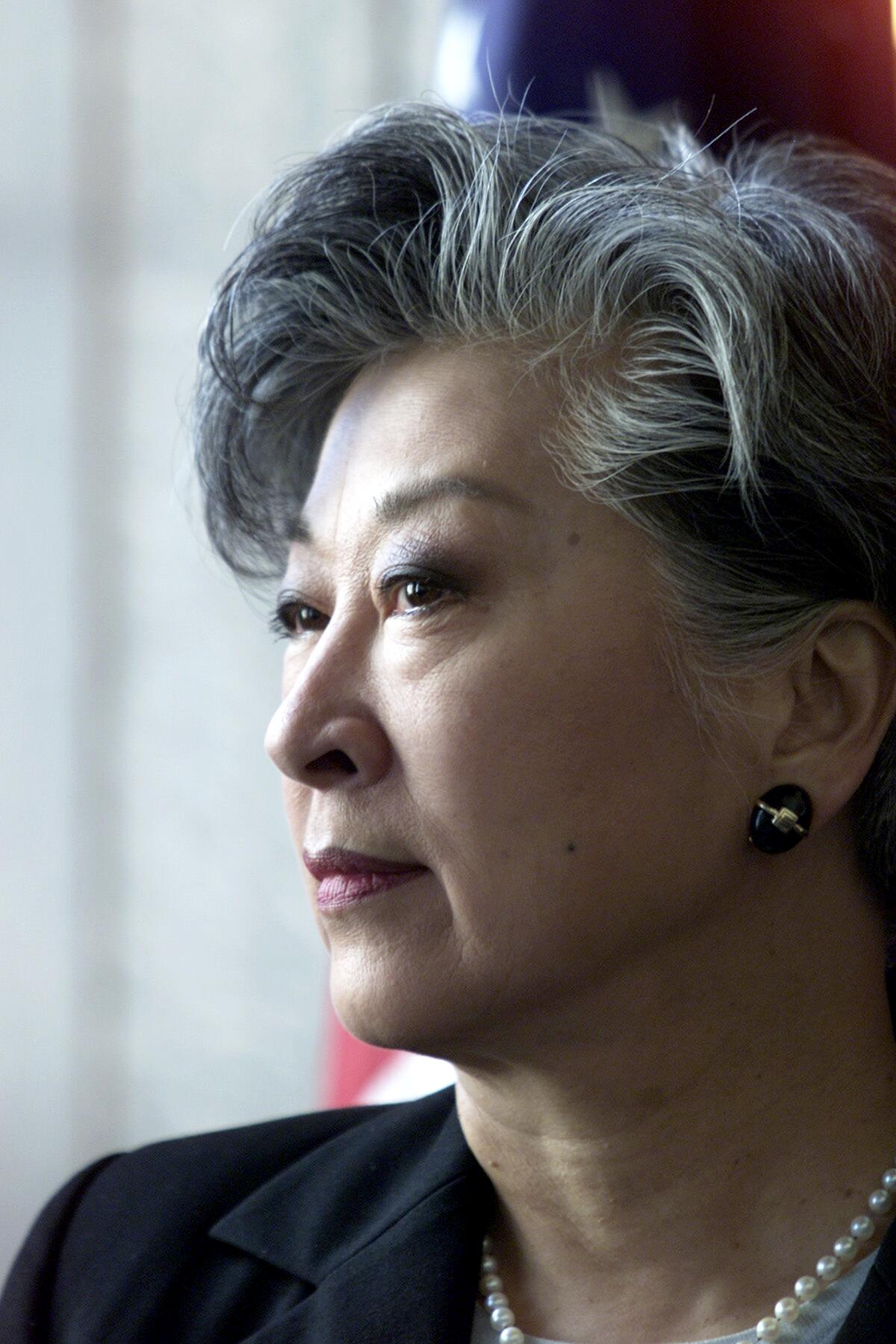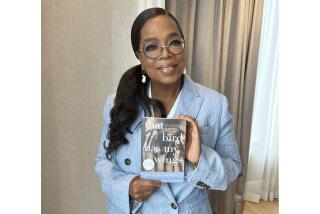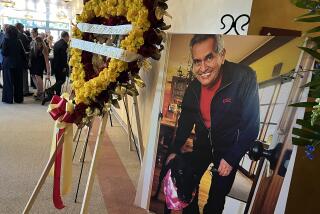Rose Ochi, trailblazer for civil rights and Japanese American causes, dies at 81

Rose Matsui Ochi, a trailblazing Los Angeles attorney who tapped far-flung political networks from City Hall to Congress in her fierce advocacy of civil rights, criminal justice reform and Japanese American causes, has died at 81.
Ochi died Dec. 13 at a local hospital after being diagnosed with a second bout of COVID-19, which exacerbated existing health problems, her husband, Thomas Ochi, said.
Ochi broke barriers as the first Asian American woman to serve as a Los Angeles Police Commission member and as an assistant U.S. attorney general. She advised L.A. Mayors Tom Bradley and James Hahn on criminal justice, served on President Carter’s Select Commission on Immigration and Refugee Policy and worked with President Clinton on drug policy and race relations.
But she particularly cherished her contributions to the successful campaigns to win recognition and redress for the mass incarceration of 120,000 people of Japanese descent during World War II — including her and her family, who were uprooted from their Boyle Heights home and imprisoned at the Rohwer detention camp in Arkansas after Japan bombed Pearl Harbor in 1941.
She would play pivotal roles in helping the community win a federal apology and monetary payments to camp survivors in 1988 and secure approval of the Manzanar camp in the Owens Valley as a national historic site in 1992.
An image of 2-year-old Yuki sitting on a suitcase at Union Station, waiting for a train to take her to the internment camp, resonated for decades.
Ochi was just 3 years old when she was incarcerated but it fired her lifelong commitment to fight for the underdog, said William T. Fujioka, a close friend and former Los Angeles County chief executive. “The injustice of the relocation burned something into her soul,” he said.
In a 2014 interview, Ochi recalled how racism shaped her. During a yearlong stay in Nevada after the war, she was made to wash her mouth out with soap by a teacher in front of the class for speaking Japanese, and soldiers threw snowballs and directed racial epithets at her, she said.
“Somehow I learned that I’m not a real American. I’m an outsider,” Ochi said in the interview with the UCLA Library Center for Oral History Research. “And instead of feeling like you’re ostracized, I just felt very strong, and I think over the years I was allowed to take on unpopular causes or stand up for people that are being beaten up ... because I was an outsider, and it’s something that I embrace and I like.”
Ochi was born on Dec. 15, 1938, in East Los Angeles, one of four children to Yoshiaki and Mutsuko Matsui. Her father was a businessman and her mother a homemaker and later seamstress. Ochi described herself as a gregarious tomboy who loved sports and never took no for an answer.
She cajoled her father to set aside his chauvinistic views about gender roles and teach her the Japanese martial art of kendo — which she said helped her develop the courage to endure getting hit and face her own fears. She dismissed her high school counselor’s remarks that she wasn’t smart enough for college but would be a good secretary.
“Excuse me? Me, take orders? You’ve got to be kidding,” she said in her UCLA interview.
When an Inyo County supervisor declared that the Manzanar project would only proceed “over my dead body,” Ochi drove to the next meeting and convinced him to go along with the plan by extolling the tourism and economic benefits it would bring to the area, according to Bruce Embrey, whose mother, Sue Kunitomi Embrey, was a founder of the Manzanar Committee and brought Ochi on as their pro-bono attorney.
“Rose, being the force of nature she was, was instrumental in winning over many in the Owens Valley to understand the benefits to have a national park,” he said.
After the war, the family returned to polyglot East L.A., where they forged friendships beyond the insular Japanese community with Mexicans, Jews, Italians, Scots, Armenians, Russians, Africans. That upbringing would shape Ochi’s ability to develop alliances across races, cultures and politics, said Darlene Kuba, who said she regarded Ochi as a second mother and role model who mentored her when she was a young staff member in then L.A. City Councilman Gilbert Lindsay’s office.
Ochi attended Roosevelt High School, graduated from UCLA in 1959 and taught at various schools, including her alma mater, Stevenson Junior High in East L.A., before earning a graduate degree in education at Cal State Los Angeles in 1967. But Ochi, inspired by the 1968 East L.A. walkouts by Latino students demanding equal education, decided that law would be a better path to fight for social change.
In 1972, she earned a law degree from Loyola Law School, where she met a key mentor: Terry J. Hatter Jr., then a law professor who would bring her into the USC Western Center on Law and Poverty and later Bradley’s Criminal Justice Planning Office.
At the Western Center, Ochi served as co-counsel on a landmark 1970s case, Serrano vs. Priest, which forced California to adopt a more equitable education funding system. Hatter recommended that Ochi replace him as director of the mayor’s criminal justice office when he moved on in 1975. Now a senior judge in the U.S. Central District Court, Hatter said he was impressed by Ochi’s “outstanding” legal mind, work ethic and ability to get along with others.
“I saw her as a rising star,” he said, “I could see that in her as a first-year law student.”
During two decades in the criminal justice office, Ochi helped develop programs to reduce gang violence by supplementing law enforcement with neighborhood organizations to help redirect at-risk youth. The office also worked on community policing, drug abatement, domestic violence and diversifying the Los Angeles Police Department’s officer ranks.
In 1995, Ochi joined the Clinton administration to work on drug enforcement, then two years later was named an assistant attorney general to head the Department of Justice’s community relations service office, which focused on race relations. After returning to Los Angeles in 2001, she was appointed to the Police Commission by Hahn and a year later became executive director of the California Forensic Science Institute at Cal State L.A.
Billionaire developer Rick Caruso, who served with Ochi on the Police Commission, said she knew the finest details about policing and asked the tough questions. “She was a true leader when it comes to police reform,” he said.
Ochi also pushed for immigration reform, including amnesty for those in the United States illegally, as a 1979 Carter appointee to the president’s commission on the issue. In addition, Ochi tried her hand at electoral politics but failed in both a 1982 bid for a U.S. congressional seat and a 1989 campaign for a Los Angeles Community College District trustee post.
Ochi’s many friends say her long resume of accomplishments and awards does not capture her warmth, generosity, loyalty and fun-loving spirit.
Ron Wakabayashi, who worked with Ochi in the Department of Justice, said she would quietly pay tuition and buy clothes for needy students, remember birthdays and seek out young people to mentor. An online memorial page is filled with tributes from Hahn, LAPD Chief Michel Moore, L.A. Community College District Trustee Mike Eng, U.S. Rep. Judy Chu (D-Monterey Park) and former L.A. County Dist. Atty. Steve Cooley.
“Rose Ochi paved the way for people like me,” Chu wrote. “There were so few Asian American women in leadership positions as I was growing that I never even dreamed that I could be an elected official, let alone a Congressmember. But Rose was so bold that she was an inspiration to me.”
In her oral history interview, Ochi shared a key message she said she always tried to convey:
“Do not let anyone define who you are. No. Or limit your aspirations. Never.”
Times staff writer Richard Winton contributed to this report.
More to Read
Start your day right
Sign up for Essential California for the L.A. Times biggest news, features and recommendations in your inbox six days a week.
You may occasionally receive promotional content from the Los Angeles Times.







